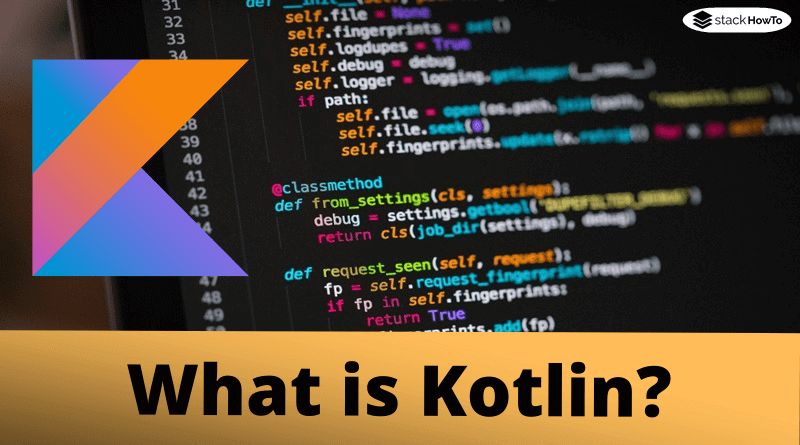What is Kotlin?
Kotlin has spread very quickly in the developer community, especially with the support of Google. Still, many talented people wonder, what is Kotlin? Why does the language get so much attention? This article explains the origins of the Kotlin programming language, its features and applications in various areas of data processing, and how it differs from Java.
What is Kotlin?
Kotlin is a statically typed, high-level programming language that combines features of object-oriented and functional programming paradigms.
The Kotlin programming language was developed by JetBrains, a multinational software company. The popular Java IDE IntelliJ IDEA development environment also comes from this company. Because the language was mainly developed by JetBrains programmers in Saint Petersburg, they called the language Kotlin, after an island just outside the city.
The project first appeared in 2011 when JetBrains introduced a new language that had features not available in other programming languages. In 2012 JetBrains made this project available as open-source under the Apache 2 license.
The first stable version, Kotlin v1.0, was released in February 2016. The latest version at the time of this writing is v1.3, which was released in October 2018.
Syntax and functional programming
The syntax of this language is very short and meaningful. The code combines the characteristics of object-oriented and functional programming styles, in contrast to Java, which up to JDK 7 did not offer support for functional programming.
Kotlin adds some functional programming features like Lambdas in JDK 8. However, the language completely follows the patterns of functional programming from the start. Because of this, it can provide higher code efficiency than Java with fewer lines of code.
Kotlin contains various functional programming functions such as lambda expressions, closure tails, higher-order functions, inline functions, anonymous functions, generics, and recursion.
Like Java, the Kotlin source code is first converted to bytecode and executed on a Java Virtual Machine (JVM), independent of an external environment or an external operating system. JVM is the virtual machine that allows the operating system to run programs written in Java or another compatible programming language whose code is compiled in Java bytecode.
Interoperability with Java
Kotlin offers complete interoperability with Java. The code can easily be called from Java, and existing Java code can also be called from Kotlin without any problems.
Kotlin code can also be compiled into JavaScript source code. It enables a programmer to convert his source code into Javascript code.
A transpiler (also called transcompiler) is a source-to-source compiler that uses the source code of one programming language as input and generates the corresponding source code of another programming language as output.
Official language for Android
At the 2017 Developer Conference, Google recognized Kotlin as the official programming language for the Android platform. This makes Kotlin the third official language of the Android platform alongside Java and C++.
Until early 2016, Kotlin was just an optional programming language for Android. Then Google decided to work with JetBrains to further develop the basics of this language. As of version 3.0 of the Android Studio development environment, users now have the option of choosing Java or Kotlin for developing Android apps.
At the 2019 developer conference, google even named Kotlin the preferred programming language for Android.
What is the difference between Kotlin and Java?
Today Android Studio ships with integrated Kotlin support. So creating an Android project that understands Kotlin code is as easy as checking a box in Android Studio’s project creation wizard. But what functions does Kotlin have that Java does not?
Here are the main differences:
- If you compare a Kotlin class to a Java class that does the same job, the Kotlin class is generally much more concise. In particular, the amount of code to be written in Kotlin can be significantly reduced.
- Kotlin offers developers the opportunity to add new functions to a class. These extension functions are also available in other programming languages, but they are not available in Java.
- The following Kotlin functions are also currently not available in Java:
- Lambda expressions
- Control structures
- Expansion functions
- Zero security
- String templates
- Primary constructors
- First-class delegation
- Type inference for variable and property types
- Deviation of the declaration point and type projections
- Range expressions
- Server overload
- Accompanying objects
- Data classes
- Separate interfaces for read-only and changeable collections
- Coroutines
- Unlike Java, a Kotlin class can have a primary constructor and one or more secondary constructors. It’s also not uncommon for a project to have multiple classes that just contain data. In Java, you will find that you have to write a lot of code for these classes, even though the classes themselves have very little functionality.
- Unlike Java, Kotlin supports the composition over inheritance design pattern through first-class delegation (sometimes called implicit delegation). In delegation, a receiving object delegates operations to a second delegation object, which is an auxiliary object with the original context.
- Kotlin supports all existing Java frameworks and libraries, including advanced frameworks based on annotation processing, although some Java libraries already provide Kotlin extensions such as RxKotlin.
How can I use Kotlin when developing?
Like Java, Kotlin is a very powerful and reliable language. But Kotlin is clearer and more efficient than Java and other programming languages. Google has chosen Kotlin as the official language for Android, especially for the development of mobile apps.
However, this does not affect the popularity of Java as Google continues to support Java for Android and will continue to do so. The Android operating system is largely based on Java. So Java will continue to exist. Kotlin and Java will be supported in parallel by Google in the coming years.
If you are thinking about using Kotlin or Java for Android development, you should be aware that there is a third option: Using Java and Kotlin.
Conclusion
As you can see, there are many good reasons to choose Kotlin over Java. But there are also some areas where Java is better. Perhaps the most important reason is: Many developers are simply more familiar with Java. It is likely that the Kotlin-Java debate will not be resolved anytime soon as both languages have their advantages and disadvantages.





